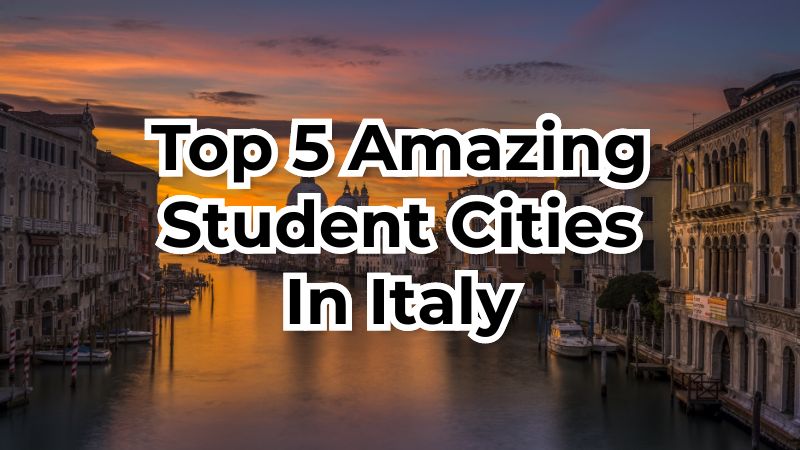
Italy, renowned for its rich cultural heritage, stunning landscapes, and world-class education system, has emerged as a popular study destination for international students. However, many students from non-English speaking countries are apprehensive about taking the International English Language Testing System (IELTS) to secure admission to Italian universities. The good news is that several Italian universities offer English-taught programs, and there are alternatives to the IELTS requirement for those seeking to pursue higher education in this enchanting Mediterranean country. In this article, we will explore the opportunities and alternatives available for studying in Italy without the need for IELTS.
How to Study in Italy Without IELTS?
Achieving your dream of studying in Italy without the need for IELTS is an attainable goal with the right approach. Here’s a step-by-step guide to help you through the process:
- Research and Create a List: Begin by conducting thorough research to identify universities in Italy that welcome international students without requiring the IELTS exam. Make a comprehensive list of these institutions and take note of the courses they offer and their specific eligibility criteria.
- Explore University Websites: Dive into the websites of the shortlisted universities to gather detailed information about their academic programs, faculty, campus facilities, and any additional language requirements they may have. This will give you valuable insights to make an informed decision.
- Evaluate Your Options: Analyze the universities and courses that align best with your academic and career aspirations. Consider factors such as course content, university reputation, location, and potential career prospects after graduation.
- Prepare Application Documents: Once you’ve selected the ideal university, start preparing the necessary application documents. These typically include your academic transcripts, letters of recommendation, a statement of purpose, and any other specific documents requested by the university.
- Check Language Preparation Courses: Although some universities waive the need for IELTS, it’s essential to determine if they offer any language preparatory courses. Participating in such programs can help you adapt to the language and cultural aspects of Italy, ensuring a smooth transition into your academic journey.
- Apply to the Chosen Universities: Submit your completed applications to the selected Italian universities without IELTS requirements. Make sure to adhere to their application deadlines and provide all necessary information accurately.
- Await Acceptance and Visa Processing: Upon submitting your applications, patiently wait for university acceptance letters. Once accepted, proceed with the student visa application process to study in Italy legally.
- Plan for Your Journey: After obtaining your student visa, plan your travel arrangements, accommodation, and other necessary arrangements to ensure a seamless transition to life in Italy.
Below are the exceptions for submitting IELTS scores:
Option 1: Italian Language Course
If you’re planning to study a course that is taught in Italian, you don’t need to take an English proficiency test. However, you will need to demonstrate proficiency in the Italian language. The Italian government offers free language courses to foreign students through the Dante Alighieri Society. These courses are available in various parts of the country and are a great way to learn the language and culture of Italy before you start your degree program. Some universities also offer Italian language courses to international students.
Option 2: SAT
The Scholastic Assessment Test (SAT) is also used for college admissions in the US. However, some Italian universities accept SAT scores instead of IELTS for English-taught courses. The SAT assesses a student’s reading, writing, and math skills. It’s important to note that not all Italian universities accept the SAT, and the minimum score required may vary from university to university. Some universities that accept SAT scores for admission to English-taught courses include Politecnico di Milano, Bocconi University, and the University of Bologna. You can check with the universities directly to see if they accept the SAT and what the minimum score requirements are.
Option 3: Proof of Prior Education in English
Some Italian universities may waive the English proficiency requirement if the applicant has completed their prior education in English. This means that if you have completed your high school or undergraduate degree in English, you may not need IELTS or any other English proficiency test to gain admission to an English-taught course. However, it’s important to note that not all universities accept this as an alternative to IELTS, and you should check with the universities directly to see if they have this option.
Option 4: Letter of Recommendation
Another option for studying in Italy without IELTS is to provide a letter of recommendation from a teacher or professor who can vouch for your proficiency in the English language. Some universities may accept this letter as an alternative to IELTS, especially if the course you’re applying for is not a highly competitive program.
Option 5: Foundation Course
If you don’t meet the English proficiency requirement for the course you want to study, you may be able to enroll in a foundation course. Foundation courses are offered by some Italian universities and are designed to improve your language skills and prepare you for the degree program. However, foundation courses may require a separate application process and additional fees.
Study in Italy Without IELTS: Universities for International Students
If you aspire to study in Italy but do not have an IELTS score, worry not! Numerous universities in Italy will gladly accept you. Here is a list of esteemed Italian universities that welcome Indian students without the need for IELTS:
- University of Bologna
- University of Milan
- University of Florence
- University of Pisa
- University of Padua
- University of Naples Federico II
- University of Trento
- John Cabot University
- Sapienza University of Rome
- University of Verona
Instead of presenting IELTS scores, these universities often assess English language proficiency through interviews. By clearing the interview process, you will receive an official letter of “acceptance” or a “confirmation letter” from the university, confirming your enrollment in the desired program.
Student Visa in Italy without IELTS
The question on many minds is “Is IELTS required for an Italy student visa?” The answer to this question is no; you won’t need IELTS if the acceptance letter from your university in Italy does not require it. This means that applicants will need to provide certain documents, including
- A valid passport.
- A letter of acceptance from your university in Italy without IELTS
- Filled Visa application form
- Proof of no criminal record
- Proof of adequate funds means to support yourself during the studies
- Proof of medical insurance
- Proof of valid accommodation in Italy
- Academic Transcripts
- Evidence that you have paid the associated application fee
In conclusion, studying in Italy without IELTS presents an excellent opportunity for international students to pursue their academic dreams in a diverse and culturally rich environment. The absence of IELTS requirements opens doors for individuals facing obstacles in meeting traditional language proficiency exams, offering a more inclusive and accessible educational experience.


